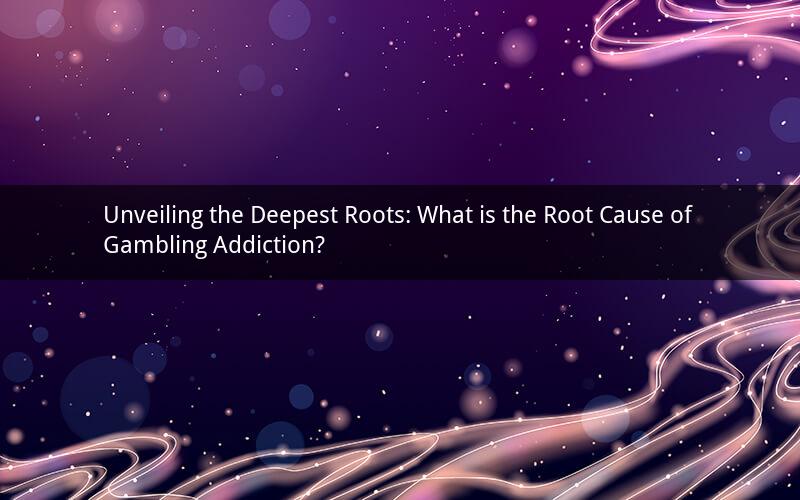
Introduction:
Gambling addiction, also known as pathological gambling, is a serious issue affecting individuals, families, and societies worldwide. It is characterized by an uncontrollable urge to gamble, despite the negative consequences it brings. Understanding the root cause of gambling addiction is crucial in combating this problem effectively. This article delves into the various factors that contribute to the development of gambling addiction, aiming to shed light on the complex nature of this disorder.
1. Genetic Factors:
One of the most significant factors contributing to gambling addiction is genetics. Research has shown that individuals with a family history of gambling addiction are more prone to developing the disorder themselves. Genetic predisposition plays a role in the brain's reward system, influencing the development of addictive behaviors.
2. Psychological Factors:
Psychological factors, such as low self-esteem, anxiety, and depression, can also contribute to the development of gambling addiction. Individuals struggling with these psychological issues may turn to gambling as a form of escapism or a means to cope with their emotions. The thrill and excitement of gambling can temporarily alleviate their psychological distress, leading to a dangerous cycle of dependency.
3. Social Factors:
Social factors, including peer pressure, exposure to gambling activities, and societal attitudes towards gambling, can also influence the likelihood of developing gambling addiction. Individuals who grow up in environments where gambling is prevalent or have friends who engage in excessive gambling may be more susceptible to developing the disorder themselves.
4. Environmental Factors:
The availability and accessibility of gambling opportunities play a crucial role in the development of gambling addiction. With the rise of online gambling and the proliferation of casinos, individuals have easier access to gambling activities, increasing their chances of developing an addiction. Additionally, the marketing and advertising strategies used by gambling industries can also contribute to the allure of gambling.
5. Cognitive Factors:
Cognitive factors, such as the belief in one's ability to control gambling outcomes and the misperception of gambling as a means to wealth, can also contribute to the development of gambling addiction. Individuals who believe they can outsmart the odds or see gambling as a quick way to make money are more likely to engage in excessive gambling behavior.
6. Cultural Factors:
Cultural factors, including the normalization of gambling in certain societies, can also influence the development of gambling addiction. In regions where gambling is widely accepted and even encouraged, individuals may be more likely to engage in excessive gambling behavior without realizing the potential consequences.
7. Personal Factors:
Personal factors, such as a history of trauma or abuse, can also contribute to the development of gambling addiction. Individuals who have experienced trauma or abuse may turn to gambling as a way to cope with their emotions or as a means to seek control in their lives.
Conclusion:
The root cause of gambling addiction is multifaceted, involving a combination of genetic, psychological, social, environmental, cognitive, cultural, and personal factors. Understanding these factors is essential in developing effective strategies to prevent and treat gambling addiction. By addressing the underlying causes, individuals, families, and societies can work towards breaking the cycle of addiction and promoting healthier lifestyles.
Questions and Answers:
1. Q: Can someone develop a gambling addiction without any genetic predisposition?
A: Yes, while genetic factors play a significant role, individuals without a family history of gambling addiction can still develop the disorder due to other contributing factors such as psychological, social, and environmental influences.
2. Q: Is it possible to overcome a gambling addiction on one's own?
A: Overcoming a gambling addiction is challenging, and seeking professional help is often necessary. While some individuals may find success through self-help methods and support groups, professional treatment and therapy can provide the necessary tools and support for long-term recovery.
3. Q: Can gambling addiction be prevented?
A: Yes, preventing gambling addiction involves addressing the underlying factors that contribute to its development. This includes promoting healthy coping mechanisms, raising awareness about the risks of gambling, and implementing regulations to limit access to gambling opportunities.
4. Q: Are there any effective treatments for gambling addiction?
A: Yes, various treatments have proven effective in treating gambling addiction. These include cognitive-behavioral therapy, group therapy, medication, and support groups. The most suitable treatment approach depends on the individual's specific needs and circumstances.
5. Q: Can gambling addiction be completely cured?
A: While gambling addiction is a chronic condition, it can be effectively managed and controlled. With proper treatment, support, and lifestyle changes, individuals can achieve long-term recovery and lead fulfilling lives free from the grips of addiction.